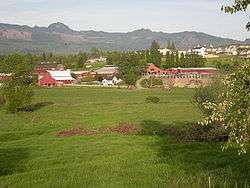Big Lake, Washington
| Big Lake, Washington | |
|---|---|
| CDP | |
 | |
 Location of Big Lake, Washington | |
| Coordinates: 48°23′36″N 122°14′11″W / 48.39333°N 122.23639°WCoordinates: 48°23′36″N 122°14′11″W / 48.39333°N 122.23639°W | |
| Country | United States |
| State | Washington |
| County | Skagit |
| Area | |
| • Total | 4.7 sq mi (12.3 km2) |
| • Land | 4.0 sq mi (10.2 km2) |
| • Water | 0.8 sq mi (2.0 km2) |
| Elevation | 92 ft (28 m) |
| Population (2010) | |
| • Total | 1,835 |
| • Density | 291.8/sq mi (112.7/km2) |
| Time zone | Pacific (PST) (UTC-8) |
| • Summer (DST) | PDT (UTC-7) |
| FIPS code | 53-06050[1] |
| GNIS feature ID | 1510824[2] |
| Highways |
|
Big Lake is a census-designated place (CDP) in Skagit County, Washington, United States. The population was 1,835 at the 2010 census. It is included in the Mount Vernon–Anacortes, Washington Metropolitan Statistical Area.
Big Lake is an exurban community in a fairly rural setting, although recent years have seen significant suburban development. The area, however, has remained primarily residential. A few notable exceptions include a playable 9-hole golf course on the lake's east side, a 1950s-themed bar & grill, a quaint community store, and a small (but quickly growing) elementary school. The latter two are located at the historic north end of the lake, once a bustling logging town. A fire destroyed much of the town proper in the early 1900s, and that which was lost was never rebuilt.
Based on per capita income, Big Lake ranks 134th of 522 areas in the state of Washington to be ranked.
Geography
Big Lake is located at 48°23′36″N 122°14′11″W / 48.39333°N 122.23639°W (48.393245, -122.236351).[3]
According to the United States Census Bureau, the CDP has a total area of 4.7 square miles (12.3 km²), of which, 4.0 square miles (10.2 km²) of it is land and 0.8 square miles (2.0 km²) of it (16.46%) is water.
Demographics
As of the census[1] of 2000, there were 1,153 people, 462 households, and 328 families residing in the CDP. The population density was 291.8 people per square mile (112.7/km²). There were 548 housing units at an average density of 138.7/sq mi (53.6/km²). The racial makeup of the CDP was 94.97% White, 0.35% African American, 1.04% Native American, 0.09% Pacific Islander, 1.30% from other races, and 2.25% from two or more races. Hispanic or Latino of any race were 2.78% of the population.
There were 462 households out of which 27.9% had children under the age of 18 living with them, 61.5% were married couples living together, 5.8% had a female householder with no husband present, and 29.0% were non-families. 19.7% of all households were made up of individuals and 4.5% had someone living alone who was 65 years of age or older. The average household size was 2.50 and the average family size was 2.89.
In the CDP the age distribution of the population shows 22.7% under the age of 18, 5.8% from 18 to 24, 28.4% from 25 to 44, 30.2% from 45 to 64, and 12.8% who were 65 years of age or older. The median age was 41 years. For every 100 females there were 104.4 males. For every 100 females age 18 and over, there were 106.7 males.
The median income for a household in the CDP was $57,500, and the median income for a family was $59,167. Males had a median income of $43,571 versus $29,821 for females. The per capita income for the CDP was $22,560. About 5.1% of families and 7.8% of the population were below the poverty line, including 14.7% of those under age 18 and 5.7% of those age 65 or over.
References
- 1 2 "American FactFinder". United States Census Bureau. Archived from the original on 2013-09-11. Retrieved 2008-01-31.
- ↑ "US Board on Geographic Names". United States Geological Survey. 2007-10-25. Retrieved 2008-01-31.
- ↑ "US Gazetteer files: 2010, 2000, and 1990". United States Census Bureau. 2011-02-12. Retrieved 2011-04-23.
| Wikimedia Commons has media related to Big Lake, Washington. |

